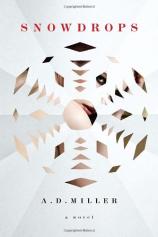Reading Group Guide
Discussion Questions
Snowdrops

1. Is Nick Platt, the narrator of Snowdrops, a good man who turns bad, a bad man to start with, or neither?
2. Towards the end of the book, Nick says that Masha “had a better excuse.” Do you think Snowdrops is at heart a story about corrupt Russians or corruptible westerners?
3. How far should Nick’s behaviour be explained by his circumstances and opportunities in Moscow, and how far by his own temperament and psychology?
4. At what point did Nick begin to question his own motives and sense of ethics?
5. When Nick visits Tatiana Vladimirovna’s apartment for the first time, he says that he “liked her immediately, and…liked her right ‘til the end.” Is that true? If so, why doesn’t it affect how he behaves?
6. Do Nick’s feelings for his fiancée change as he is recounting his tale? How does the relationship implied in the framing device interact with or reinforce his Moscow story?
7. There are several plots in Snowdrops: the main drama involving Tatiana Vladimirovna; the one featuring the Cossack and the floating oil terminal; and the story of Nick’s neighbour, Oleg Nikolaevich, and his missing friend. How do these plots relate to each other?
8. At the beginning of the story, Nick tries to be kind to Oleg Nikolaevich. By the end of it, he is less kind and spends much less time with him. Who suffers most as a result?
9. “I liked the Cossack,” Nick says after their first meeting: “Something about him was endearing...It might be better to say I envied him.” What does he mean by that?
10. At the heart of the novel is Nick’s trip to the dacha in the forest with Masha and Katya: “my happiest time,” he says; “the time I would always go back to if I could.” What does Nick learn at the dacha --- about the women and about himself?
11. How much, if anything, of what Masha and Katya tell Nick about themselves do you think is true?
12. The exact years that Nick lives in Moscow aren’t specified in the book. But, thinking about the attitudes of the lawyers and bankers in the story, do you think Snowdrops is amongst other things a pre-credit crunch tale?
13. At the end of Snowdrops, Nick says that when he thinks about what happened to him during his last winter in Moscow, “there is guilt”. But then he qualifies that by saying “there is some guilt”. Is Nick really sorry for what he did during his last winter in Moscow? Does he understand how serious it was?
14. At one point Nick describes the winter as an “annual oblivion…like temporary amnesia for a bad conscience.” What role do snow and the weather play in Snowdrops?
15. A snowdrop, as Nick’s friend Steve explains to him, is a body that lies buried or hidden in the snow, emerging only in the thaw. What does the image of the snowdrop symbolise in Snowdrops?
Snowdrops
- Publication Date: February 22, 2011
- Hardcover: 272 pages
- Publisher: Doubleday
- ISBN-10: 0385533446
- ISBN-13: 9780385533447







